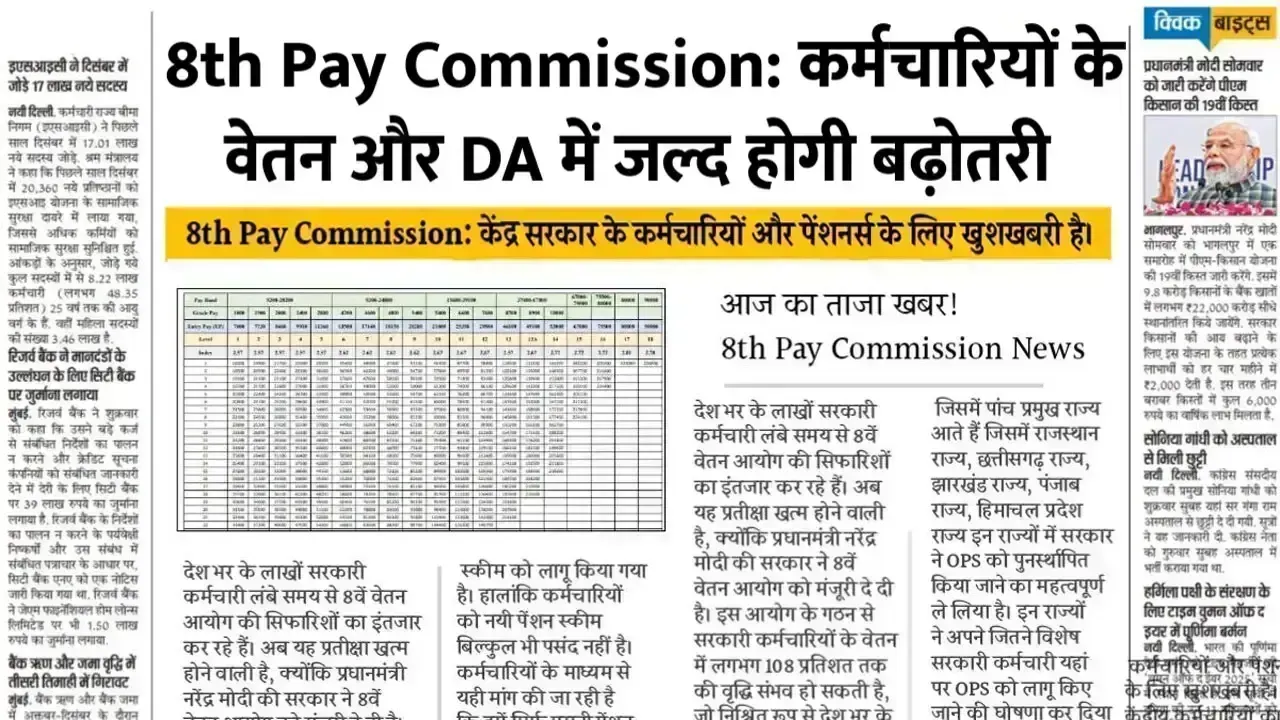Big Salary Boost! 8th Pay Commission to Raise Pay by This Much – Know When
8th Pay Commission, Major Salary Hike Likely for Government Employees and Pensioners - The Central Government is reportedly in the process of initiating the 8th Pay Commission, which is expected to result in a significant increase in the salaries of lakhs of central government employees and pensioners. With the continuous rise in inflation and the cost of living, this anticipated move aims to offer crucial financial relief.
The implementation of the 8th Pay Commission is also likely to help restore the real value of income, ensuring that employees' purchasing power is not eroded over time. Let’s explore the latest updates, expected salary hike, implementation timeline, and all essential details related to the 8th Pay Commission.

What is the 8th Pay Commission?
The Pay Commission is a government-appointed body that is constituted approximately every 10 years to review and revise the salary structure of central government employees and pensioners. Its primary aim is to ensure fair, transparent, and inflation-adjusted compensation for public servants.
The 7th Pay Commission was implemented in 2016, bringing significant changes to the pay and pension structure. Now, the 8th Pay Commission is anticipated to come into effect around 2026. It is expected to benefit more than 50 lakh central government employees and over 65 lakh pensioners across the country.
With rising costs of living and economic changes, the 8th Pay Commission will focus on ensuring that government employees and retirees receive salaries and pensions that reflect current economic realities.
Why is the 8th Pay Commission Needed?
In light of rising inflation, stagnant real incomes, and the escalating cost of living, the demand for the 8th Pay Commission (8th CPC) has gained significant momentum. Government employees and unions are increasingly vocal about the urgent need for a new salary revision framework that aligns with current economic realities.
Key Reasons Supporting the 8th Pay Commission:
- Inadequate Adjustment in the 7th CPC: The 7th Pay Commission has not kept pace with inflation over the past eight years, resulting in a growing mismatch between salary hikes and actual cost of living.
- Decline in Real Wages: Employees, particularly at lower and middle levels, have seen a drop in their purchasing power due to stagnant salaries amid rising prices.
- Persistent Union Demands: Various government employee unions have repeatedly submitted representations to the Finance Ministry, emphasizing the urgent need for a comprehensive revision.
- Outdated Social Security and Benefits: Gratuity, pension, and other retirement-related benefits require an update to meet modern-day financial and social security needs.
Expected Salary Hike Under 8th Pay Commission
Although the government hasn’t released the official figures yet, analysts and employee unions have provided projections based on past trends.
| Current Pay Matrix Level | Existing Basic Pay (7th CPC) | Expected Basic Pay (8th CPC) | Estimated Hike (%) |
|---|---|---|---|
| Level 1 | ₹18,000 | ₹26,000 | 44% |
| Level 3 | ₹21,700 | ₹31,200 | 43.7% |
| Level 4 | ₹25,500 | ₹36,500 | 43.1% |
| Level 6 | ₹35,400 | ₹50,800 | 43.5% |
| Level 7 | ₹44,900 | ₹64,200 | 42.9% |
| Level 10 | ₹56,100 | ₹80,000 | 42.6% |
| Level 13 | ₹1,23,100 | ₹1,75,000 | 42.2% |
| Level 14 | ₹1,44,200 | ₹2,04,000 | 41.4% |
Major Financial Benefits Expected
The 8th Pay Commission will not just revise basic pay but will impact a number of additional allowances and retirement benefits.
Likely Benefits:
- Revised House Rent Allowance (HRA)
- Increased Transport Allowance
- Update in Dearness Allowance (DA) formula
- Improved Gratuity and Pension calculations
- Higher fitment factor expected (from 2.57 to possibly 3.68)
Fitment Factor Impact Table:
| Fitment Factor | Current Basic (₹25,000) | New Basic Pay |
|---|---|---|
| 2.57 (7th CPC) | ₹25,000 | ₹64,250 |
| 3.00 | ₹25,000 | ₹75,000 |
| 3.50 | ₹25,000 | ₹87,500 |
| 3.68 (Expected) | ₹25,000 | ₹92,000 |
When Will the 8th Pay Commission Be Implemented?
Based on current trends and expert analyses, the 8th Pay Commission is anticipated to come into effect from 1st January 2026. While the official announcement is still awaited, it is expected that key updates and proposals may be presented in the Union Budget 2025.
Tentative Timeline Overview:
- Formation of Committee: Likely to be initiated in early 2025
- Submission of Recommendations: Expected by mid to late 2025
- Implementation Date: Projected from 1st January 2026
- Payment of Arrears: May be disbursed retrospectively from the date of effect
This timeline is based on patterns observed in previous pay commissions, but official confirmation is still pending from the government.
Who Will Benefit from the 8th Pay Commission?
The recommendations of the 8th Pay Commission are expected to benefit a broad group of individuals and entities associated with the central government. The primary beneficiaries include:
- Central Government Employees across all departments, ministries, and cadres
- Personnel from key sectors such as the Indian Railways, Defence Services, and the Postal Department
- Retired Government Employees, who will see revisions in their pensions
- Family Pensioners, who depend on the pensions of deceased government servants
- Serving Members of the Armed Forces, who will benefit from updated pay structures
- Employees of Autonomous Bodies that follow the central government pay scale structure
These reforms aim to ensure fair compensation, improved living standards, and enhanced motivation among government workers and retirees.
What Are the Employee Unions Demanding?
Employee unions and federations have jointly submitted a list of key demands to the government, urging timely and fair implementation of the next pay revision:
- The implementation process should not be postponed beyond the year 2026.
- A minimum monthly wage of ₹26,000 or more must be ensured.
- The fitment factor should be revised to at least 3.68 times the current basic pay.
- Pensioners should also benefit from corresponding upgrades in pension, aligned with the pay hike.
- Pay revisions should be carried out every 8 years instead of the current 10-year cycle.
These demands are presently under consideration by the relevant ministries. A formal response is expected from the Finance Ministry, potentially in the upcoming Union Budget announcements.
Challenges Ahead for the Government
While the upcoming decision is expected to benefit government employees, several financial challenges could influence its implementation.
Key Challenges:
- High fiscal deficit: The government is already managing a significant fiscal burden, which may limit flexibility for large-scale pay revisions.
- Rising pension liabilities: An increasing number of retirees adds pressure to the exchequer through a growing pension bill.
- Reactions from state governments: Any central pay hike may lead to expectations of similar revisions at the state level, impacting state budgets.
- Balancing budget priorities: Allocations for welfare schemes and infrastructure development might be affected if substantial funds are diverted toward salary revisions.
Despite these constraints, mounting pressure from employee unions and broader economic factors may compel the government to take timely action.
If implemented with pro-employee measures, the 8th Pay Commission could significantly enhance the purchasing power of millions of central government employees and pensioners. Though official confirmation is still pending, early projections indicate a possible salary increase of 40% to 45% across various pay levels.
Government staff and retirees are advised to stay updated with future announcements, especially around the Union Budget 2025, which may bring more clarity on this front.
Note: The figures and projections mentioned above are based on current media reports, union demands, and past trends. Final details will only be available once the government formally constitutes the 8th Pay Commission and publishes its recommendations.


